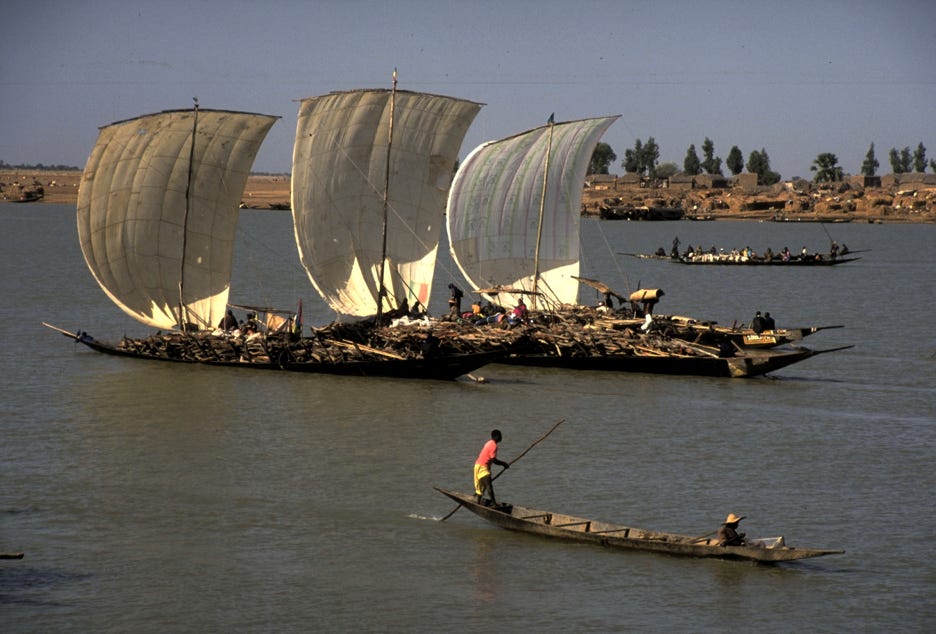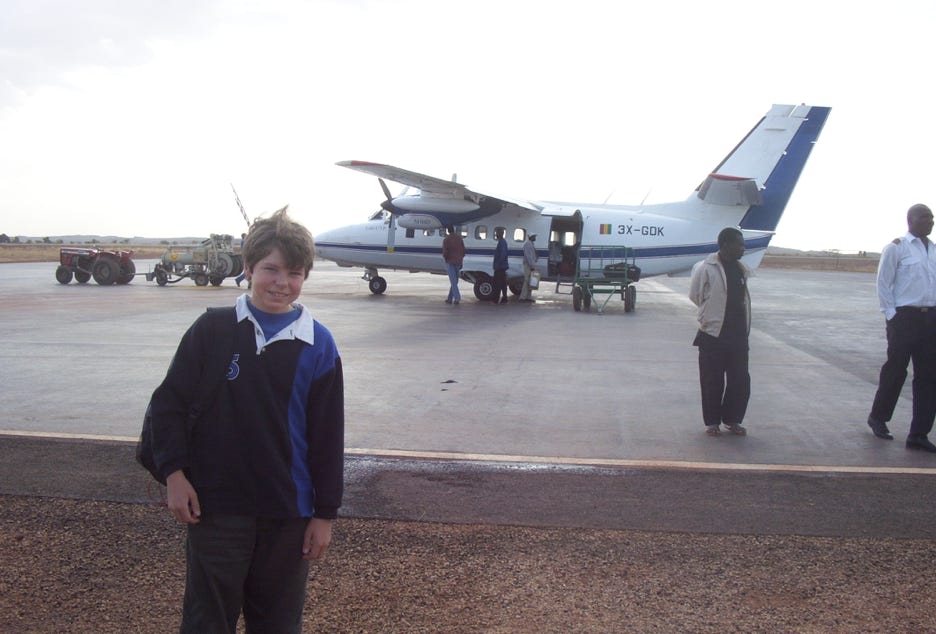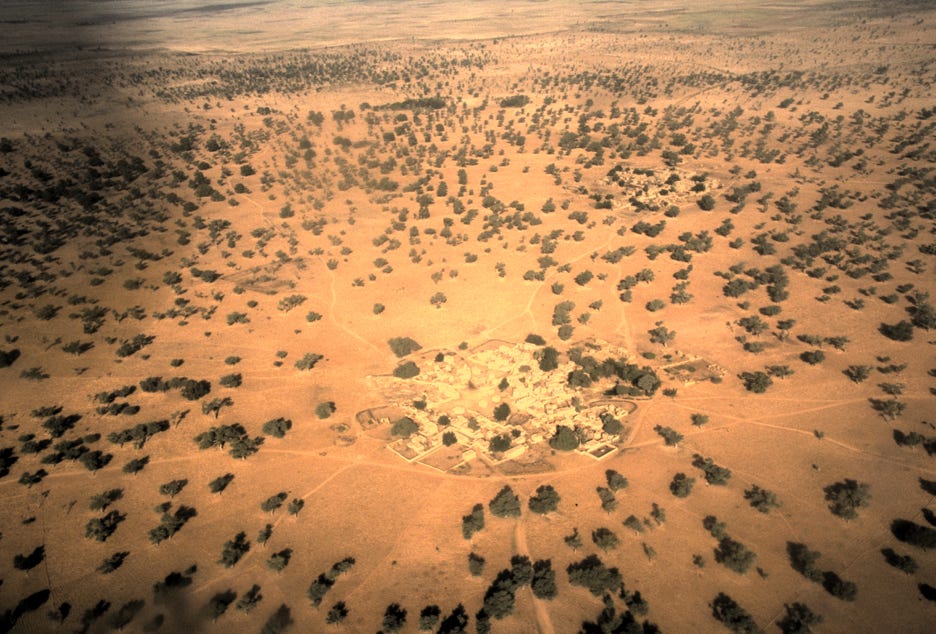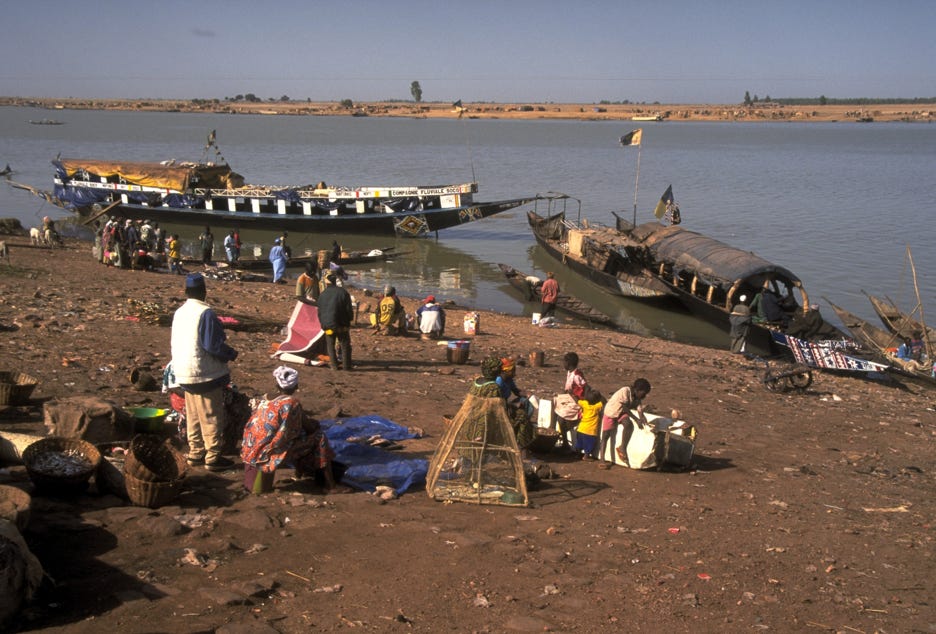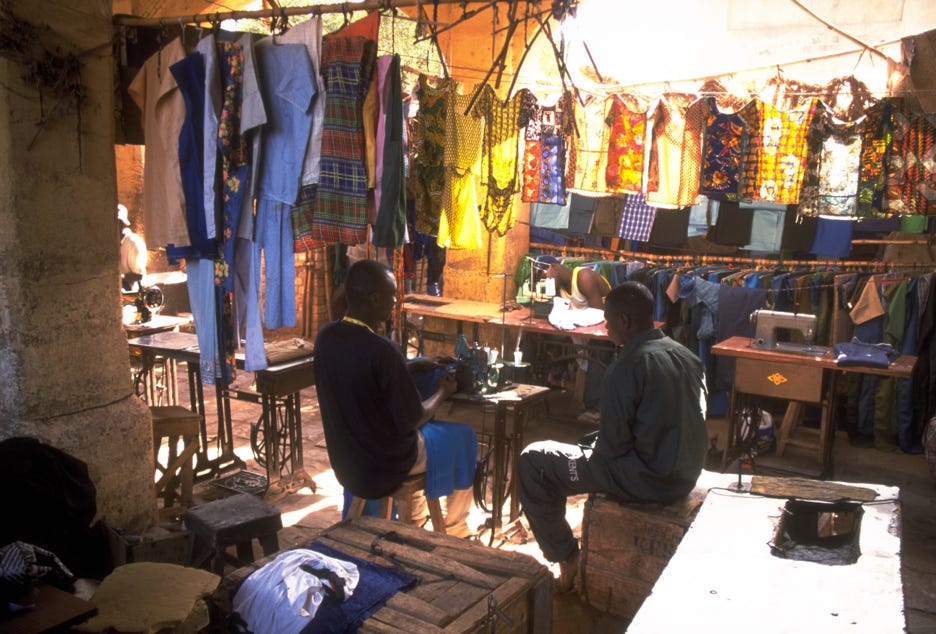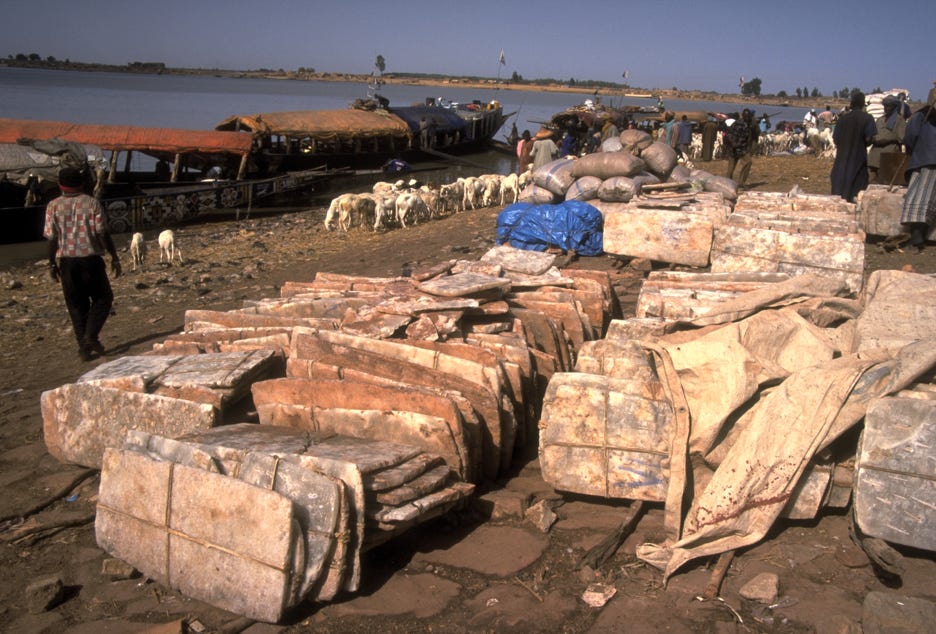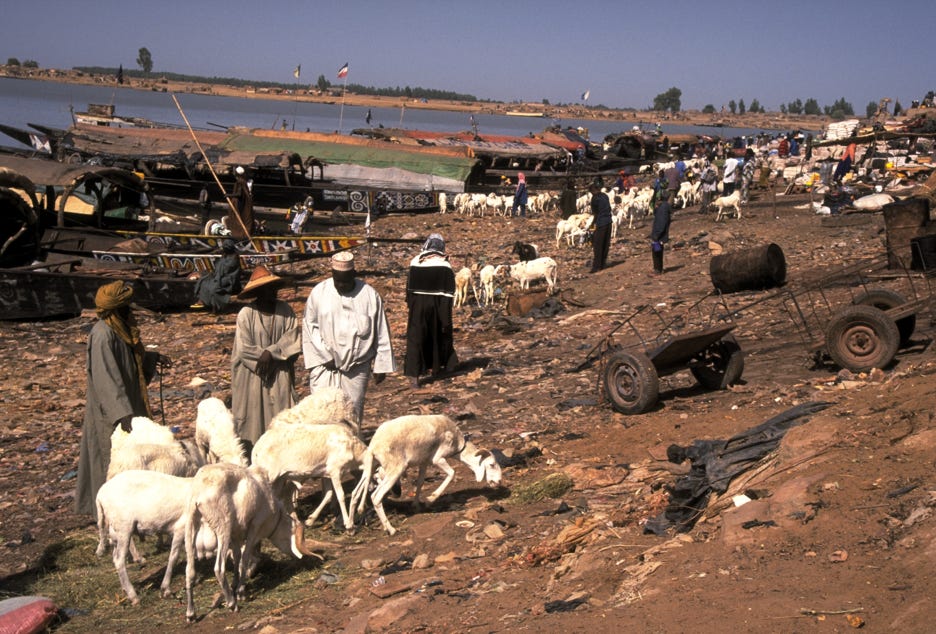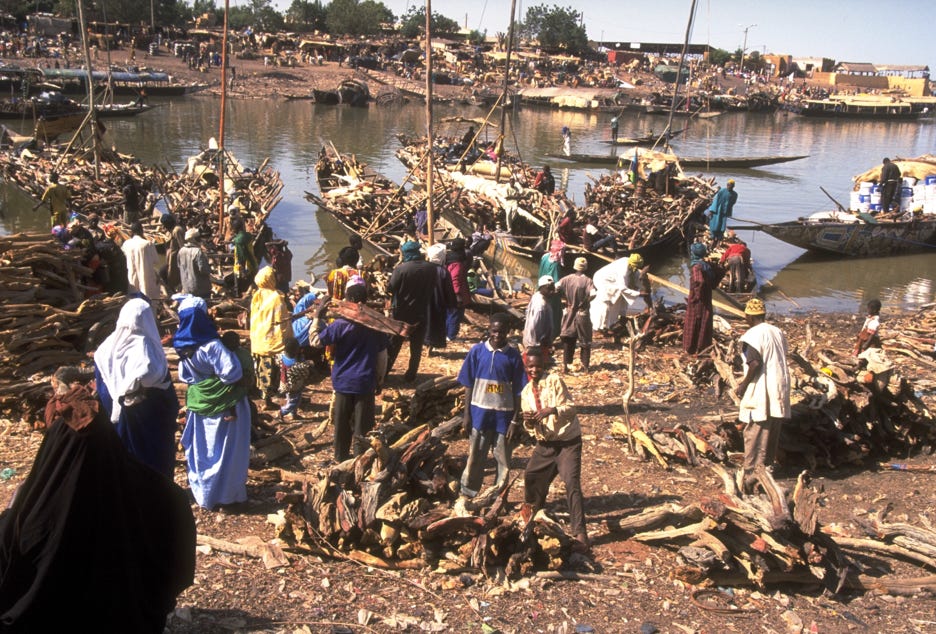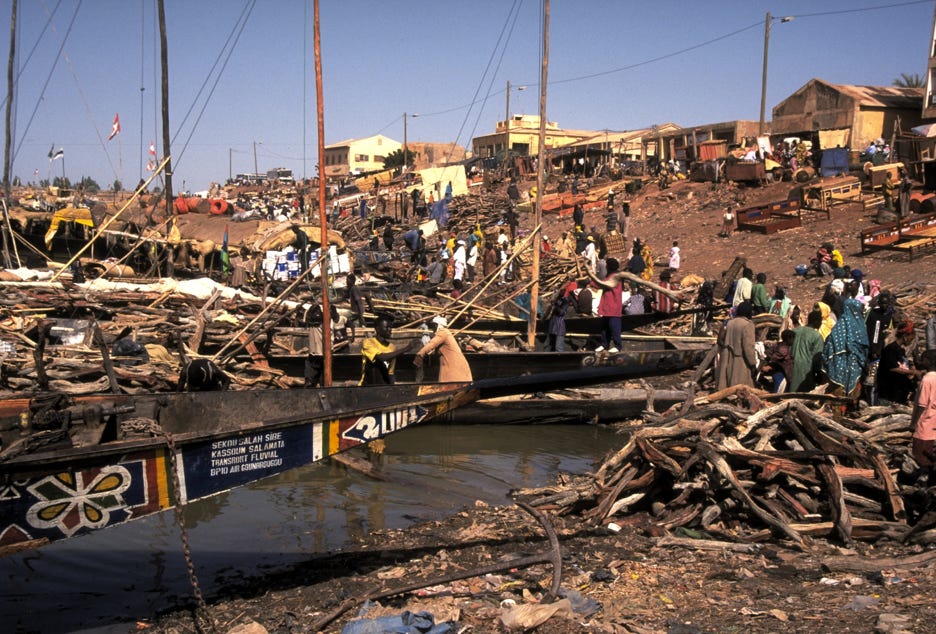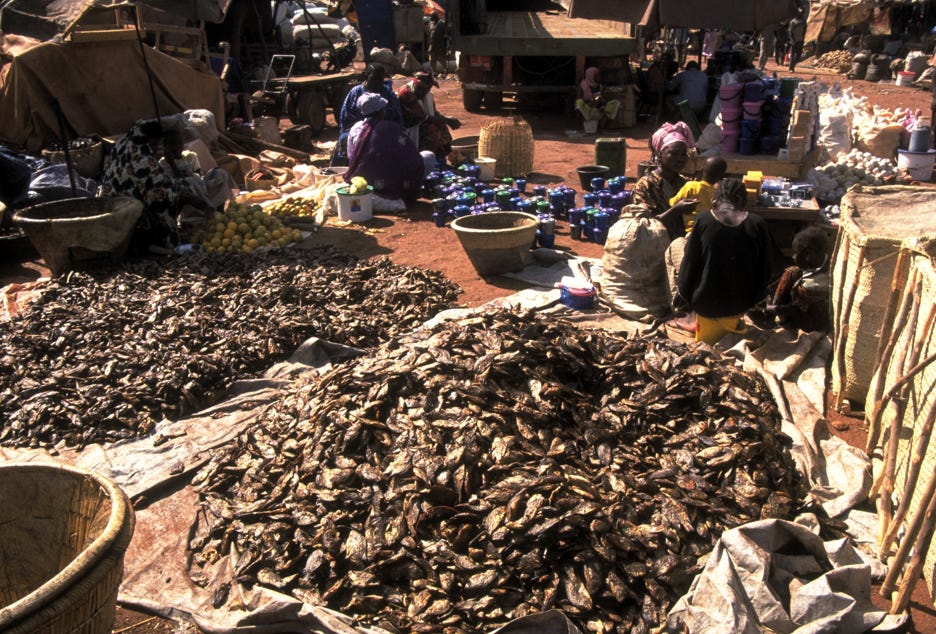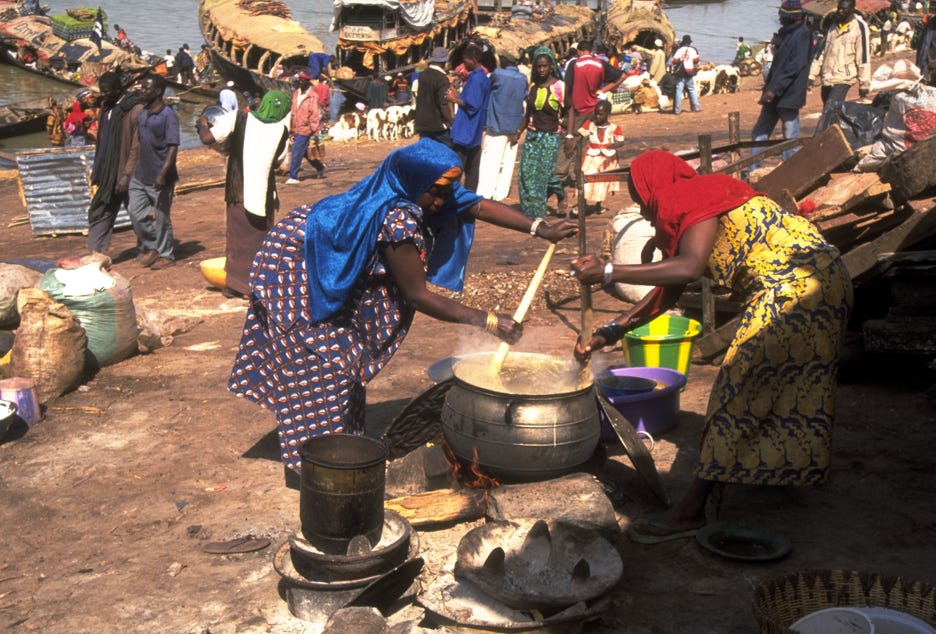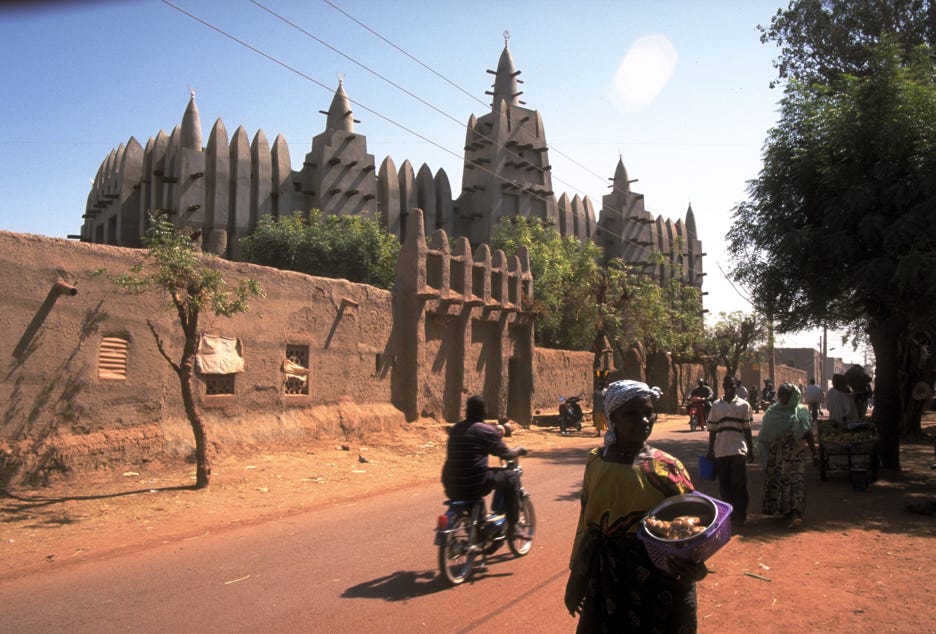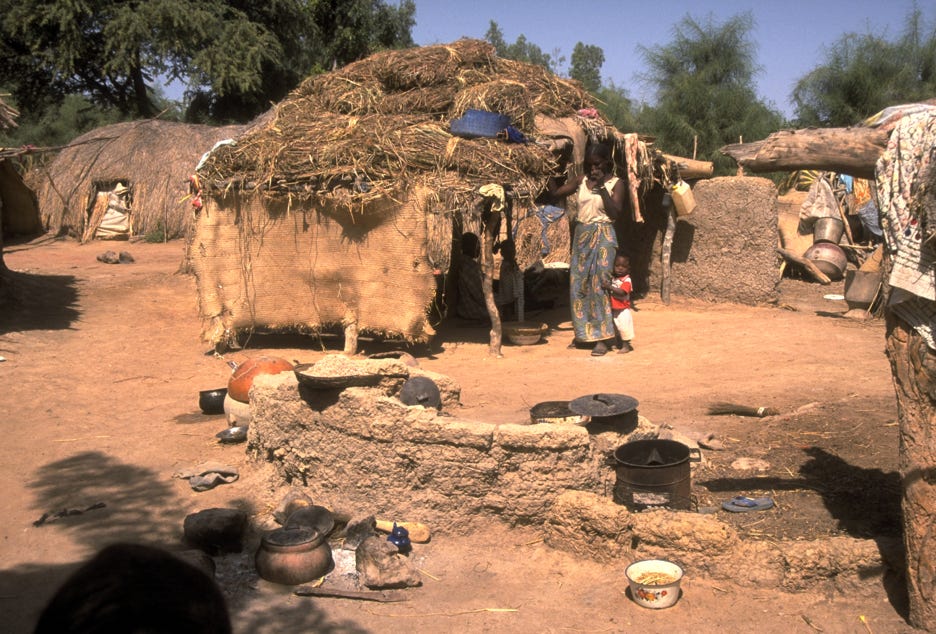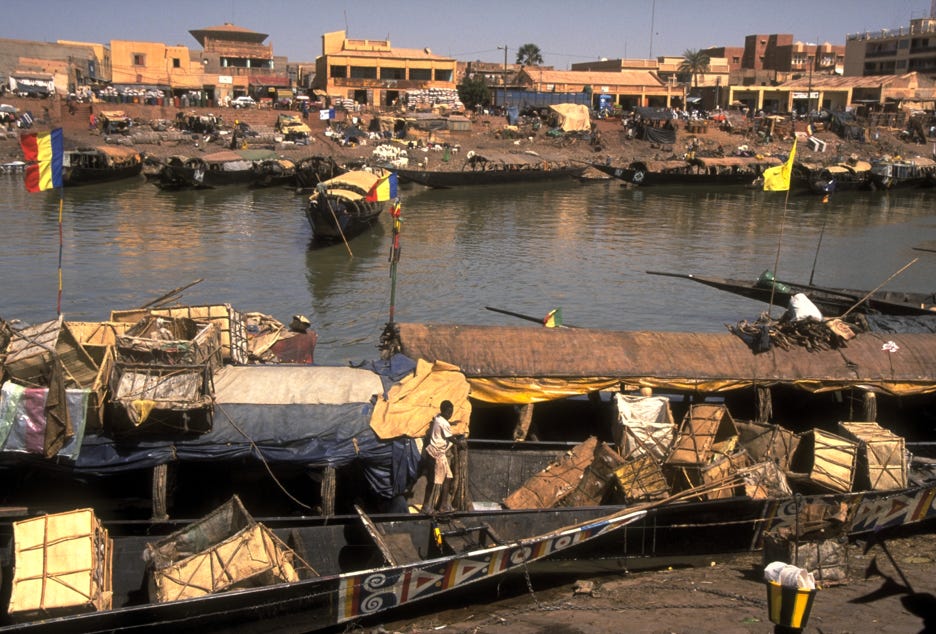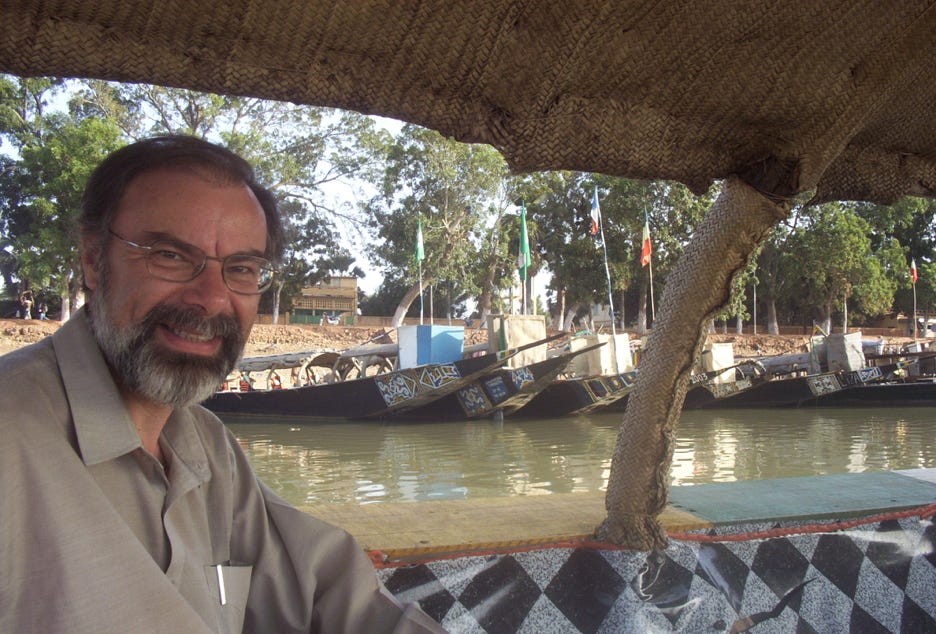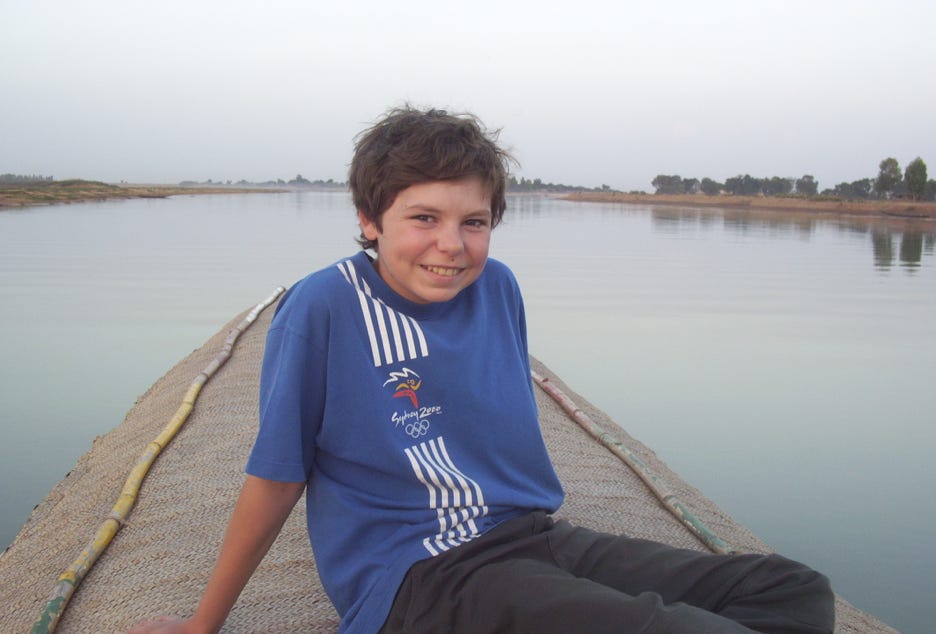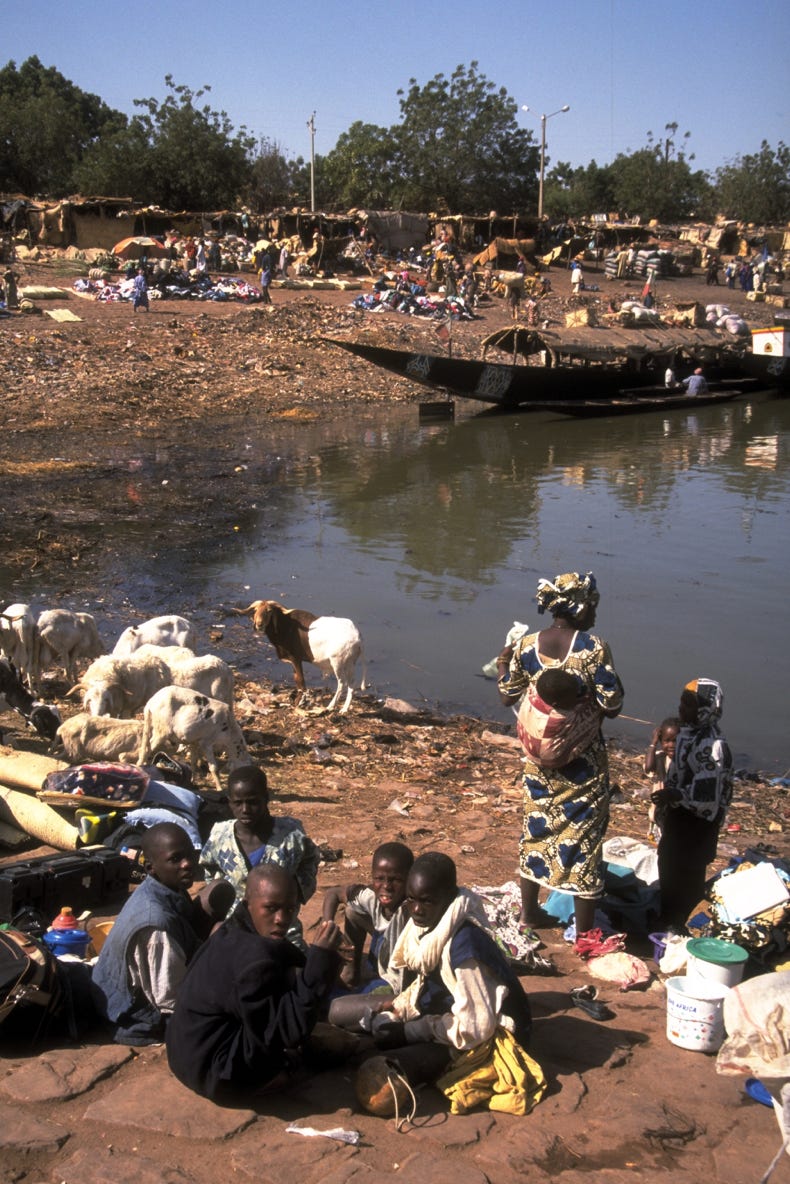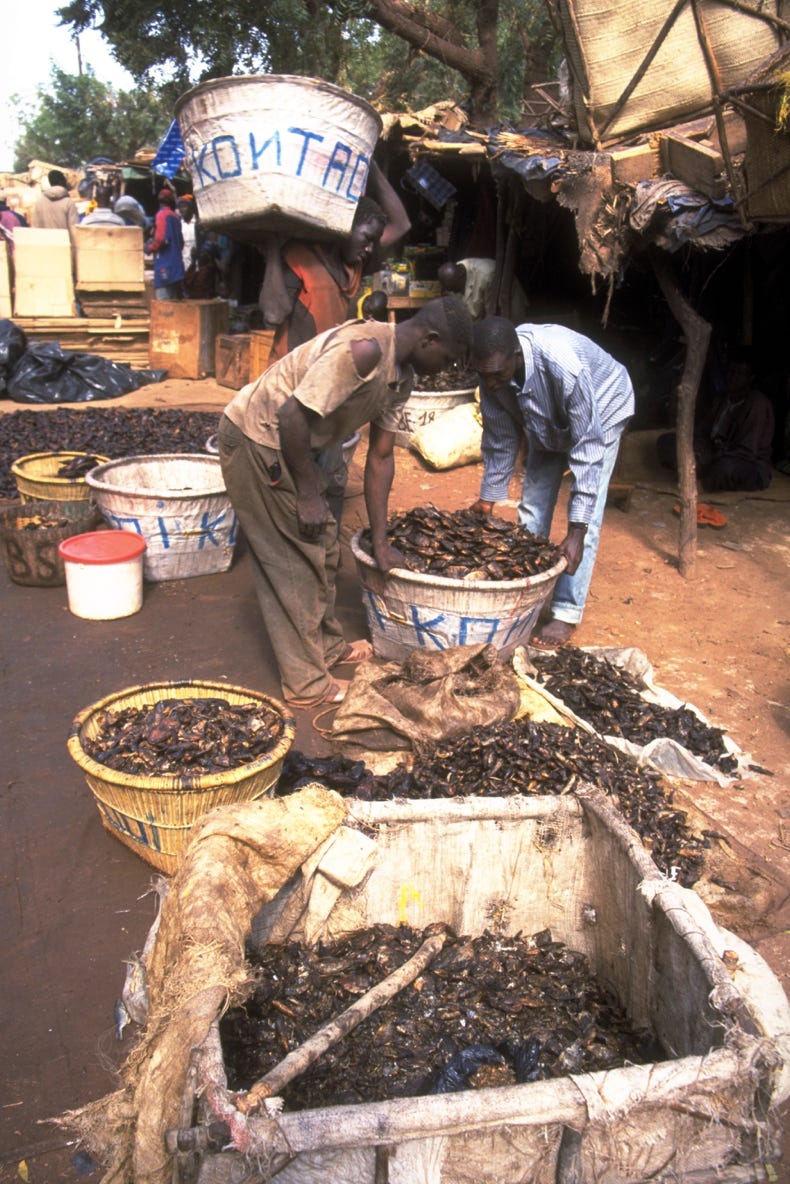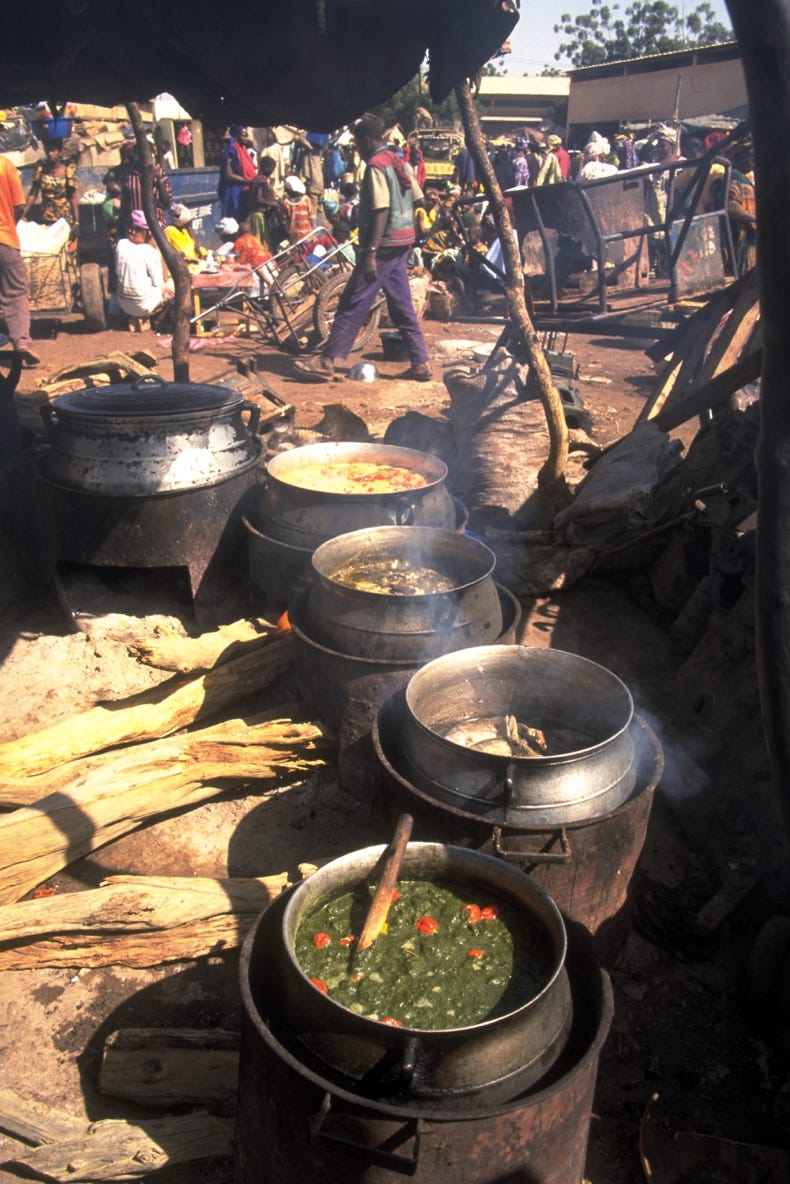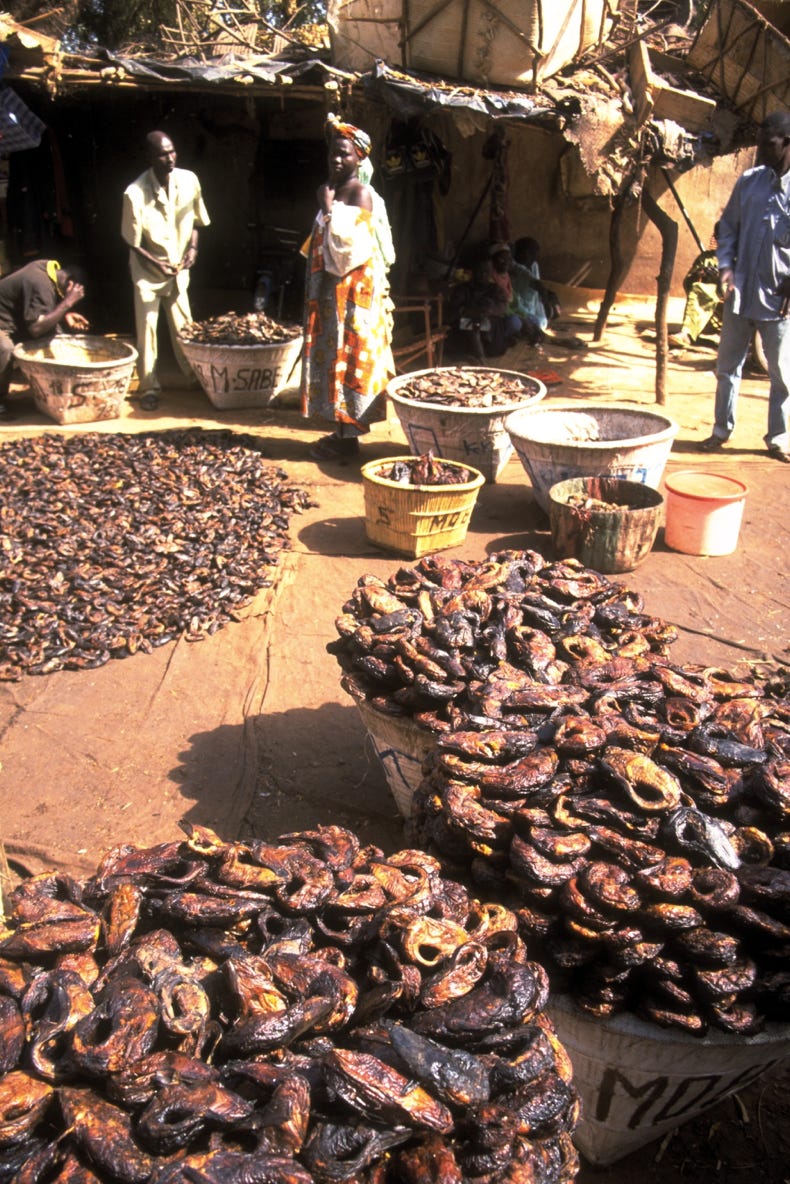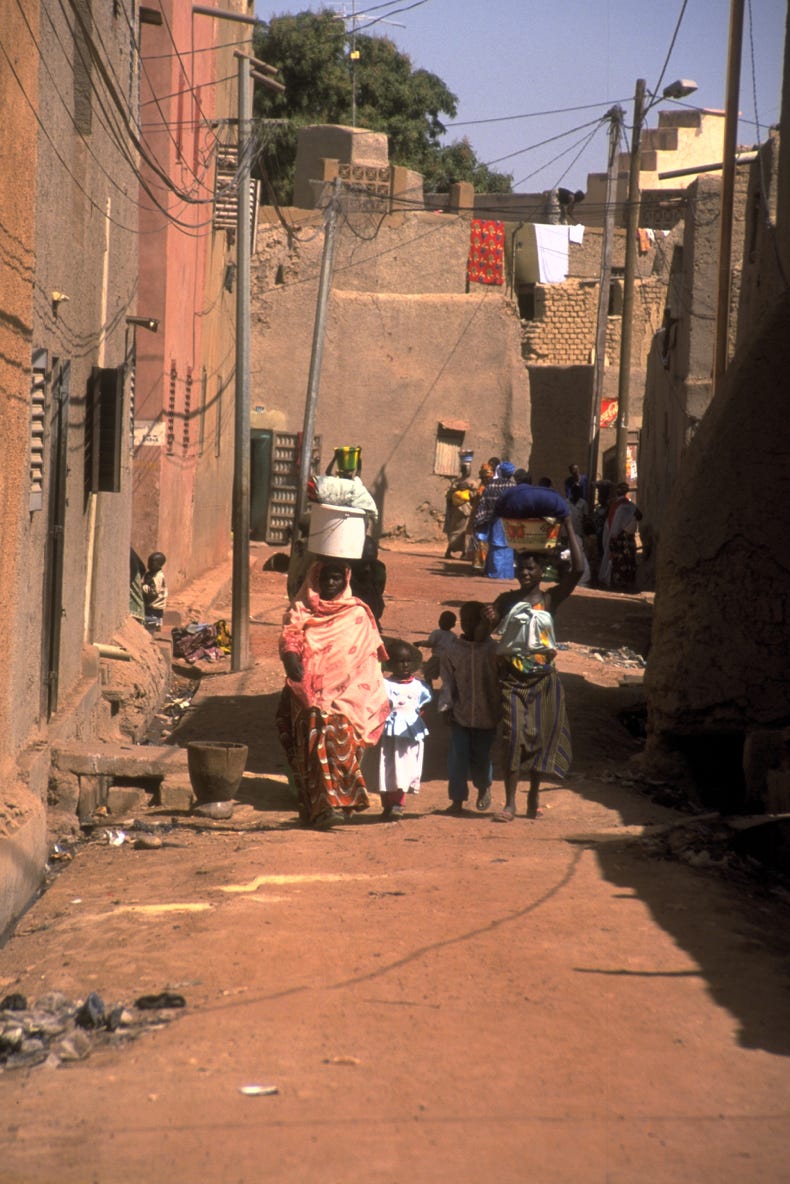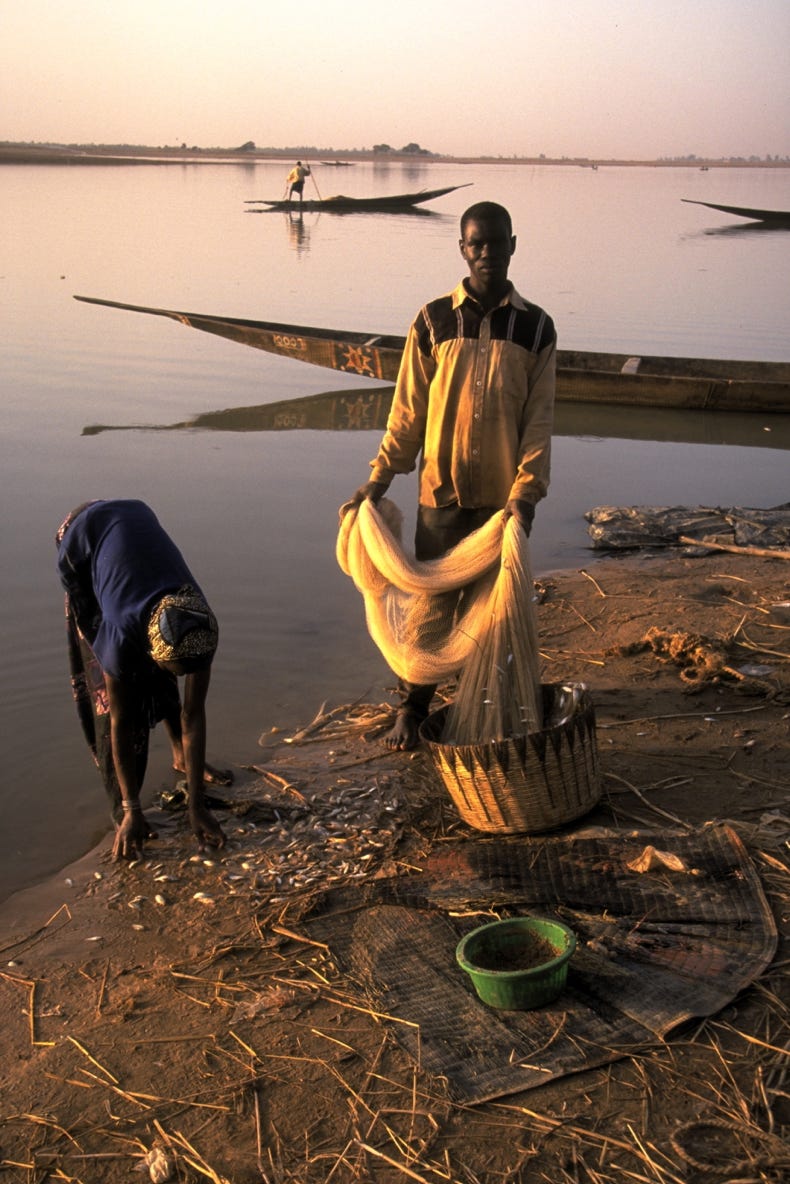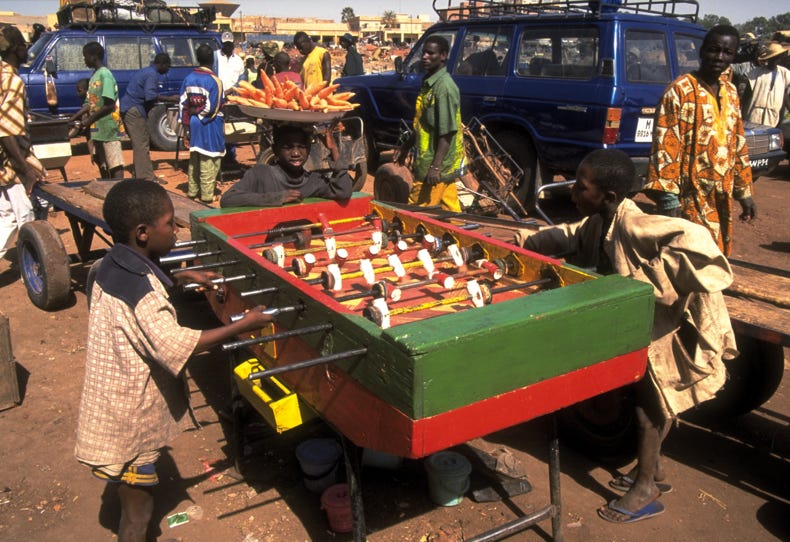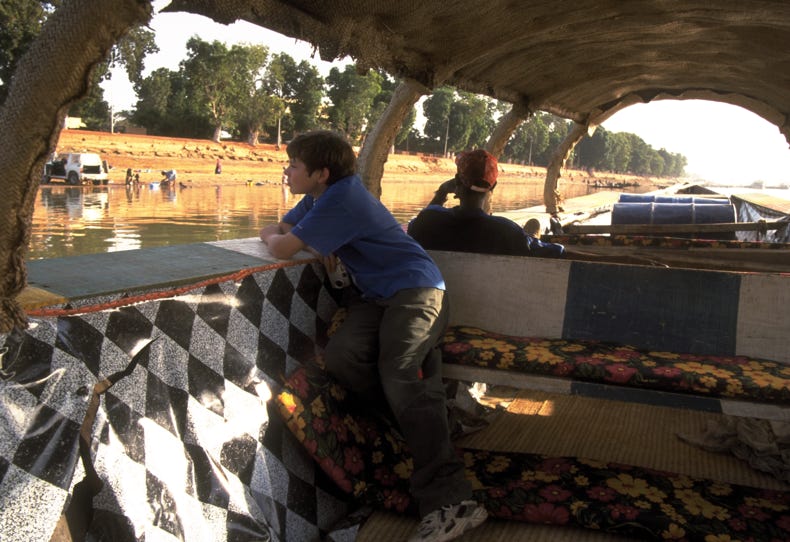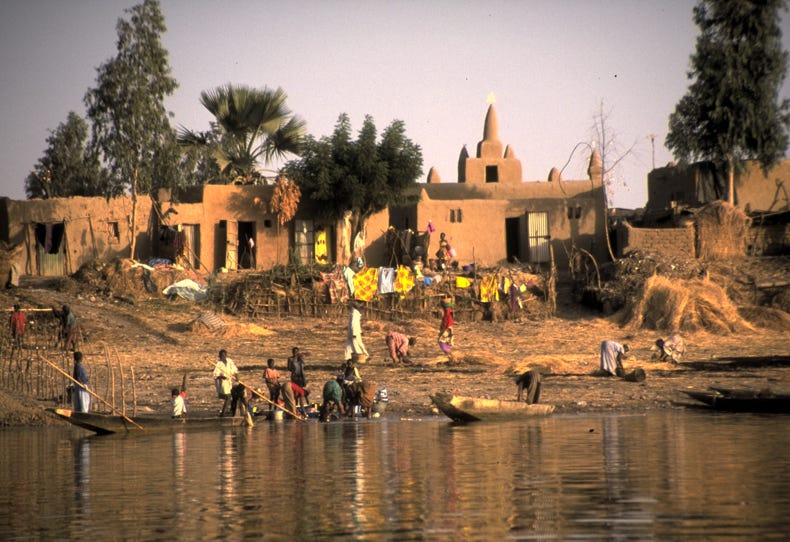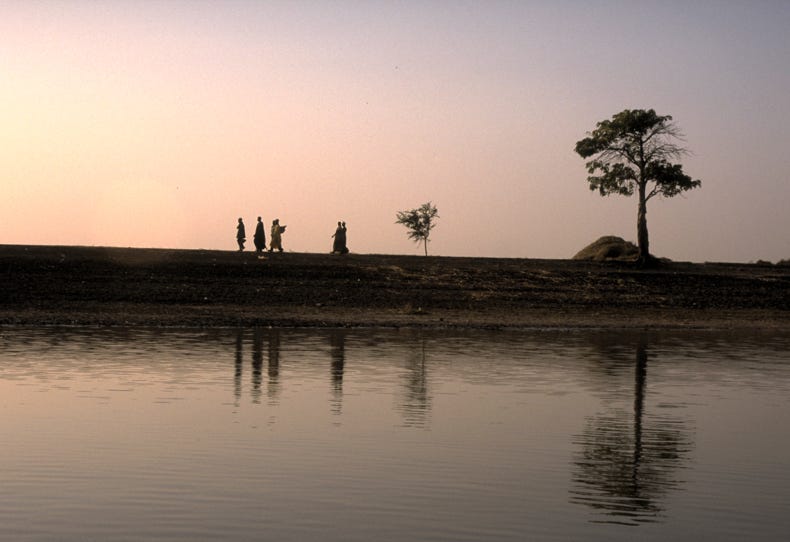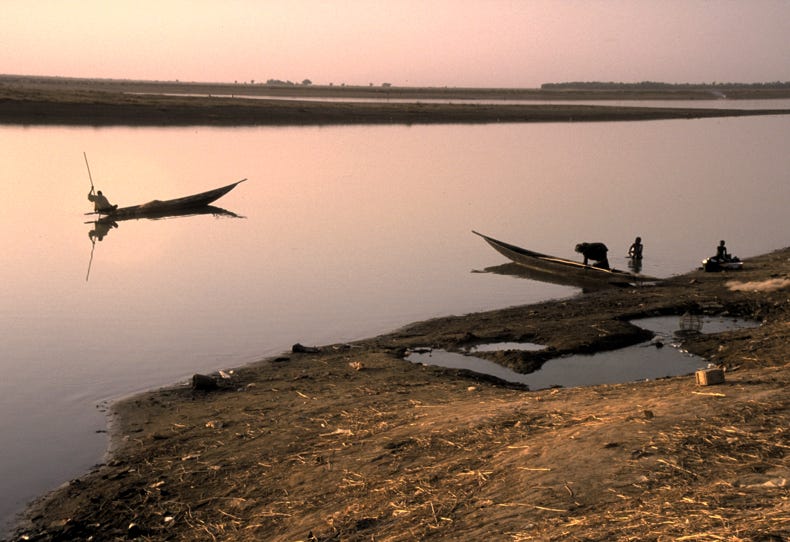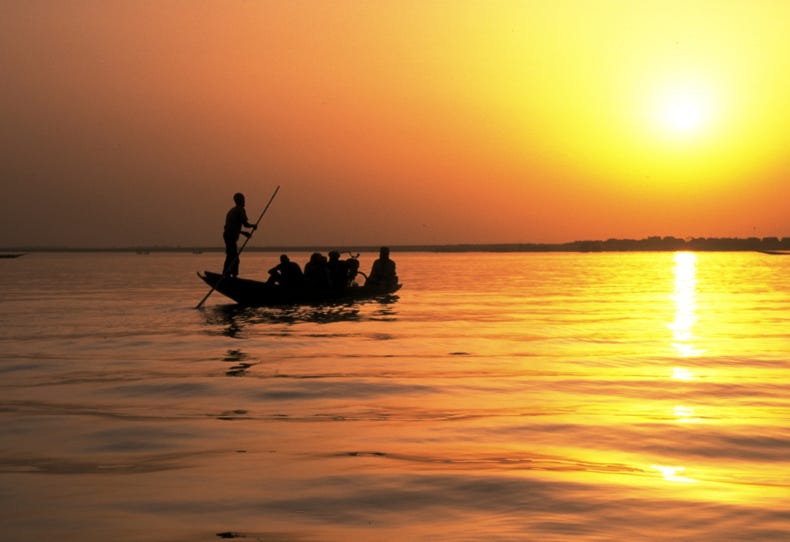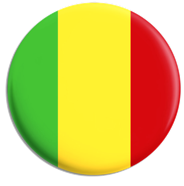

Our time here just gets better and better! We woke early (at 5:30am) to catch the flight from Timbuktu to Mopti, Mali’s fourth largest town where we had stayed overnight on the two day drive from Bamako to Timbuktu. We had only seen Mopti at night and in the early morning haze, but during the day it is a mass of vibrant colour, all the more noticeable after the dull monochromes of Timbuktu and the desert. We had an early breakfast before leaving Timbuktu, same as the previous day – Maxwell House instant coffee with powdered milk to add, some bread (with fine sand) and Omani fruit jam, and some blackcurrant juice, mixed from concentrate on request. Oh how I yearn for the warm crusty French style bread of Bamako and Mopti!
After breakfast we met Alice and drove to the airport. Check-in, like everything else was very relaxed. The security gate was unmanned and the x-ray device turned off, so when the boarding call came (a man just clapped his hands and said the French equivalent of all aboard, we just walked out of the building and onto the tarmac, walked past the young teenage soldier with the Kalashnikov machine gun, climbed into the plane, and into any seats we chose as there was no seat allocation.
The plane was an interesting multi-cultural mix. It was a Czech-made Let L-410, which from all the internal signage in Russian, was probably a second (or third or fourth or fifth?) hand plane originally used by Aeroflot in Russia. It was operated by a Malian airline, Societé Avion Express, but the plane was registered in Guinée. Naturally there was no in-flight service, as there were only 17 seats – and yes, it had propellers, not jets. Despite a bit of buffeting as we flew through some clouds, it was a good flight – beginning with the hazy overcast desert over Timbuktu (unusually for this time of year there had been some light rain on our last night there), then following the River Niger (a huge, wide expanse of a river which must be hundreds of times wider than it is deep judging by all the boats we have seen stuck to its sandy bottom), and then into sunshine as we approached Mopti, descending over beautifully laid-out mud-brick villages. Almost everyone gets a window seat on these planes, and with a high wing, the views were superb. Andrew and I were sitting in the front seats, and so had quite a good view of the flight deck – the pilots must have to learn Russian if they are to read any of the instruments!
Unlike overcast Timbuktu, the weather in Mopti was clear, hot and sunny, with hardly a cloud in the bright blue sky. This, with the red soil and the incredibly bright clothes worn by the people, made the contrast with Timbuktu all the greater.
After checking into our hotel (the same one where we had stayed on the way to Timbuktu), we set off on a walking tour of the river port and the city markets. What an amazing array of sights, colours, smells, sounds and experiences! There was colour and action everywhere. The port handles river traffic from upstream and downstream of the River Niger, mostly in long, thin boats without hulls, called pirogues. A few larger boats with great white sails are also used to transport salt (in slabs) and timber, and we were lucky enough to see a fleet of three of these arriving from downstream carrying timber.
The main part of the port is divided into sections that handle different goods – salt in one area, livestock in another, timber up one end and fish around the other side. Each area was different from the others and totally fascinating, with colour and action everywhere – boats crowded with people and goods, often with what looked like small livestock farms on the roofs as they were carrying so many sheep and goats. The only thing that the different parts of the port had in common was all the gunk strewn across the banks beside the port – plastics, waste water and all sorts of indescribable organic remains. I can only hope that the photos convey the flavour, the activity, the colour and the atmosphere.
It is probably worth mentioning here that some of our travels paralleled the route of Michael Palin when he filmed the BBC series Sahara in 2001-2002. If you ever have the chance to see this series, please do so (it has been on DVD if that is any use to you!), because he captures the feeling of Africa with great wit and perceptivity. His description of the port at Mopti (in his book Sahara) is typical of his ‘I wish I had said that’ observations:
It’s not hard to find the Niger River ferry boats. They look like floating apartment blocks. Three blue and white, triple-decked, steel-hulled monsters drawn up alongside one another. There’s no way to get to them that doesn’t involve slithering down the effluent-strewn bank of the river, and I have to pick my way over discarded tins, dismembered animals, twisted clothing, motor car parts, a petrified cat with rictus grin and string pulled tight around its neck, and other things that I dare not even look at.
You will understand now why Andrew and I elected not to ‘slither’ down to have a close look at the Niger River ferry boats! We did, however, spend a couple of hours walking around the river front (I could have spent three days there happily) before heading off through the fish markets (where some fish remain three or four months before being sold!), a boat building shed, and the craft markets, and on to the grand mosque. This mosque was built in the same mud brick style as the one in Timbuktu, but was not as big, and in fact the top of it had been rebuilt using grey concrete after the original mud collapsed during heavy rains last year. The effect was pretty ugly.
From the mosque we drove through the residential part of Mopti before stopping a tribal village, grass huts and all, built on the edge of the town. It was an area inhabited by a tribe (the Bela) that was traditionally nomadic, but who lost all their cattle (and thus their wealth) during a prolonged drought during the 1970s. They moved into Mopti and established their village within the town.
We walked through the village, past the huts and livestock and gardens, and their poverty was evident. Even the well they had there had dried up, and the mosque was just an open square courtyard with mud bricks built up about 2 metres in height; they could not even afford a roof. When we visited, only the women and children were around (apart from a few older men) as the working age men were in the town earning an income.
By this time it was time for lunch (actually we had arranged it for 12:30, but we arrived at about 1:00pm) – a very tasty and cheap pepper steak with chips in a restaurant overlooking the river port that we had visited that morning. It would be hard to find a more exotic setting to eat lunch that overlooking the Niger River port at Mopti, experiencing once again all the sights, sounds, smells and colour of the morning – although why anyone would order fish after walking through that smelly fly-infested section of the markets I do not know.
After lunch, by which time the weather became very hot indeed, we had a couple of hours free before meeting at 4:30pm for a sunset trip in a pirogue on the Niger River. The time out was appreciated, as it gave Andrew a chance to download his images onto the computer (he had filled the memory chip this morning with the flight and the port visit – I like him; he sometimes takes even more photos than I do!), and time for a swim in the pool at the hotel – his first opportunity for a swim on this trip.
Then at 4:30pm we headed across the road from the hotel to the banks of the river to get into the pirogue for the two hour river trip. By that time the heat of the day was fading and the afternoon light was taking on a rich golden colour that made the natural earthy colours of the river banks and buildings, and the bright colours of the people’s clothes and boats, quite stunning.
The cruise was both exhilarating and relaxing – exciting for the riverside views (washing, bathing, shopping, transporting, port activity, cooking, pounding grain, herding animals, smoking fish [beats tobacco!!!] – you name it) and the activity of small boats everywhere on the river, and relaxing for the slow rhythmic of the boat’s engine (usually just at idling speed except when we had to avoid another boat) and the glass smooth surface of the lazy river.
The first part of the trip went past (and into) the port area that we had visited this morning, and it was great to see everything again from a water perspective. From there we went further upstream to a Bozo (the name of the tribe) settlement built on an island within the river, where we went ashore. The Bozo people are nomadic, and during the dry season when the river is low, they set up grass huts beside the river where they live by catching, drying and smoking fish.
The evening life of the Bozo encampment was fascinating – very colourful, very active and quite aromatic (as you would expect with so much fish drying going on). As the sun was getting quite low by this time, we returned to the boat and began the return journey downstream.
The experience of sunset on the Niger River was fantastic, as the colours became more and more orange as the sun slipped below the horizon – then as soon as the sun was down, all the colour seemed to vanish into shades of grey that quickly turned into blackness as the weak little light bulbs on shore were turned on. It was quite a magic experience that Andrew enjoyed as I did – although he did so from the perspective of sitting on the roof of the pirogue for much of the return trip!
Andy (age 12) writes:
Sunday the 18th of January: Well, after I had breakfast this morning we were off to the airport for our flight to Mopti. Today I have discovered that they don’t take their airports too seriously over here. We checked in at a small work desk before going and taking a seat in the waiting area about 10 metres away there. We looked at the only clock in the entire Timbuktu airport complex; it was 2 hours behind. When it was time to board, all that happened was a guy came out clapping his hands together while saying something in French. We were on a very dodgy Russian plane that had no legroom. By “none” I mean that it was it was impossible to move my feet or legs. When we got of at the Mopti airport, we walked into a the only room in their whole complex that was pretty much a small smoke filled room with a tin roof. After retrieving our bags from a wheeled cart like those in some hotels that the bag porters use we went outside with our tour guide Sory who had driven back the day we were in Timbuktu. This airport was very relaxed about security. We were allowed to sit on one of the seats provided on the tarmac and when we went outside I noticed that there was nothing, not even a sliding gate apart from a sign that says no entry to stop you from driving straight onto the tarmac. We then drove straight to our hotel that we stayed at on Friday the 16th. Then we went to a huge market that was set up all around a huge port that was also covered in rubbish. It was divided into 4 main sections; they were salt, wood, spices and fish. In the salt section, the people there were we smashing up big blocks of compacted salt as they mine their salt. They were unloading a lot of wood from ships in the wood section before selling it. The aroma of chillies was everywhere in the spicy section. It smelt very nice.
Unfortunately, we went to the fish section afterwards. Our guide Sory informed us that some of the fish had been there for 4 months. It STANK!!! A small child, about 5 or 6, saw us in the first section we went to (salt). He only spoke French with no English. He said Bonjour and took it upon himself to be our guide even though we already had an English-speaking guide and told him that we didn’t want him to be our guide. He took no notice of this and followed us everywhere we went. He often was very annoying as his head always got into dad’s photos. He wasn’t a great guide either. All he told us was “tomatoes” or “clothes” as we passed a huge section of clothes that was really very obvious. After that, we drove to a mosque and walked around it before driving to an open restaurant that looks over the market that we visited earlier today. I had a steak with chips and a coke. After seeing the flies on all the meats earlier that day, I certainly wouldn’t have had fish but a steak seemed the safest option. We then drove back to the hotel and had a couple of hours before seeing Sory again. I went for a swim in the hotel pool. It was freezing! It took me 10 or more minutes just to get in fully. Soon, Sory was just outside the hotel and we had a river cruise. We just walked to the boat as we were staying just across the road from the river. It was very relaxing to be on a locally made boat on the River Niger during sunset. The captain of the boat was quite fun to watch. If anybody got in his way he started to shout at them and once when a small child was pushing his boat out of the way of our boat when our driver lightly hit him, he decided to take out a bit of hose and started to whip it at him. It was a magical experience. Half way through the trip, we got off on the Bozo people’s island. They have some very interesting tribe names in this country! We then had a Fanta just up the road before returning to our hotel to get some rest before meeting Sory tomorrow morning at 7:30. I should probably get ready for bed now.

